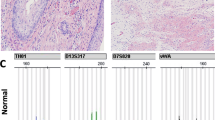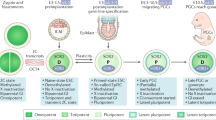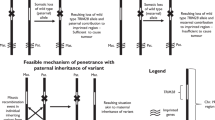Abstract
WILMS' tumour (WT), aniridia, genitourinary abnormalities and mental retardation form a symptom group (WAGR syndrome) associated with hemizygous deletions of DNA in chromosome band 11p13 (refs 1,2). However, it has not been clear whether hemizygosity at a single locus contributes to more than one phenotype. The tumour suppressor gene for Wilms' tumour, WT1, has been characterized3,4: it is expressed at high levels in the glomeruli of the kidney5, as well as the gonadal ridge of the developing gonad5, the Sertoli cells of the testis6 and the epithelial and granulosa cells of the ovary6, suggesting a developmental role in the genital system in addition to the kidney. We now report constitutional mutations within the WT1 genes of two individuals with a combination of WT and genital abnormalities as evidence of a role for a recessive oncogene in mammalian development.
This is a preview of subscription content, access via your institution
Access options
Subscribe to this journal
Receive 51 print issues and online access
$199.00 per year
only $3.90 per issue
Buy this article
- Purchase on Springer Link
- Instant access to full article PDF
Prices may be subject to local taxes which are calculated during checkout
Similar content being viewed by others
References
Miller, R. W., Fraumeni, J. F. & Manning, M. D. New Engl. J. Med. 270, 922–927 (1964).
Riccardi, V. M., Sujansky, E., Smith, A. C. & Francke, U. Pediatrics 61, 604–610 (1978).
Gessler, M. et al. Nature 343, 774–778 (1990).
Call, K. et al. Cell 60, 509–520 (1990).
Pritchard-Jones, K. et al. Nature 346, 194–197 (1990).
Pelletier, J. et al. Genes Dev. 5, 1345–1356 (1991).
Glaser, T., Jones, C., Douglass, E. C. & Housman, D. in Cancer Cells—Molecular Diagnostics of Human Cancer (eds Furth, M. & Greaves, M.) 253–277 (Cold Spring Harbor Laboratory, Cold Spring Harbor, New York, 1989).
Orita, M. et al. Proc. natn. Acad. Sci. U.S.A. 86, 2766–2770 (1989).
Knudson, A. G. & Strong, L. C. J. natn. Canc. Inst. 48, 313–324 (1972).
Grundy, P. et al. Nature 336, 374–376 (1988).
Huff, V. et al. Nature 336, 377–378 (1988).
Schwartz, C. E. et al. Genomics (in the press).
Sinclair, A. H. et al. Nature 346, 240–244 (1990).
Gubbay, J. et al. Nature 346, 245–250 (1990).
Wright, D. K. & Manos, M. M. in PCR Protocols. A Guide to Methods and Applications (eds Innis, M. A., Gelfand, D. H., Sninsky, T. J. & White, T. J.) 153–158 (Academic, New York, 1990).
Sanger, F., Nicklen, S. & Coulson, A. R. Proc. natn. Acad. Sci. U.S.A. 74, 5463–5467 (1977).
Author information
Authors and Affiliations
Rights and permissions
About this article
Cite this article
Pelletier, J., Bruening, W., Li, F. et al. WT1 mutations contribute to abnormal genital system development and hereditary Wilms' tumour. Nature 353, 431–434 (1991). https://doi.org/10.1038/353431a0
Received:
Accepted:
Issue Date:
DOI: https://doi.org/10.1038/353431a0
This article is cited by
-
Variants in SART3 cause a spliceosomopathy characterised by failure of testis development and neuronal defects
Nature Communications (2023)
-
Differential expression profiling of onco and tumor-suppressor genes from major-signaling pathways in Wilms’ tumor
Pediatric Surgery International (2022)
-
METTL14 gene polymorphisms decrease Wilms tumor susceptibility in Chinese children
BMC Cancer (2021)
-
The genetic changes of Wilms tumour
Nature Reviews Nephrology (2019)
-
Temporal expression pattern of genes during the period of sex differentiation in human embryonic gonads
Scientific Reports (2017)
Comments
By submitting a comment you agree to abide by our Terms and Community Guidelines. If you find something abusive or that does not comply with our terms or guidelines please flag it as inappropriate.



